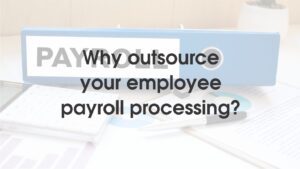The top 10 Reasons Why Payroll outsourcing Fails
Payroll outsourcing has become increasingly popular over the years, with many businesses choosing to outsource their payroll processing to third-party service providers. Outsourced payroll can provide businesses with a number of benefits, including cost savings, improved accuracy, and enhanced compliance with regulatory requirements. However, despite the many advantages of payroll outsourcing, it is not always successful. In this blog post, we will explore some of the reasons why payroll outsourcing fails.
Lack of Understanding of Business Needs
One of the primary reasons why payroll outsourcing fails is a lack of understanding of the business needs. Before a company decides to outsource its payroll, it must first assess its requirements and determine whether outsourcing is the best solution. Outsourcing may not be suitable for all businesses, and it is important to consider factors such as company size, payroll complexity, and the need for customization.
If a company does not fully understand its payroll needs, it may choose the wrong outsourcing provider or select a service package that does not meet its requirements. This can lead to issues such as inaccurate payroll calculations, delays in processing, and poor communication between the company and the outsourcing provider.
Poor Communication
Effective communication is essential for successful payroll outsourcing. However, poor communication is a common reason why outsourcing fails. Communication breakdowns can occur due to a lack of clarity in the service agreement, inadequate training for staff, and insufficient access to payroll data.
When outsourcing payroll, it is important to establish clear communication channels between the company and the outsourcing provider. This can be achieved through regular meetings, timely updates, and the use of technology tools such as messaging apps or project management software.
Lack of Control
Outsourcing payroll can sometimes lead to a loss of control over the payroll process. This can occur when the outsourcing provider does not provide sufficient visibility into the payroll process or fails to involve the company in key decisions.
To avoid a loss of control, companies should establish clear expectations and procedures for outsourcing providers. This may include regular reporting, access to payroll data, and involvement in decision-making processes.
Poor Service Quality
Another reason why payroll outsourcing fails is due to poor service quality. This can occur when outsourcing providers do not have the necessary skills or resources to provide quality services or when the outsourcing provider is unable to meet the company’s service level agreements.
To avoid poor service quality, companies should conduct due diligence when selecting outsourcing providers. This may include researching the provider’s reputation, experience, and credentials, as well as conducting reference checks and reviewing sample work.
Security Risks
Outsourcing payroll can also expose companies to security risks. This may include data breaches, identity theft, and fraud. Security risks can occur due to inadequate security measures by outsourcing providers or due to internal vulnerabilities within the company.
To mitigate security risks, companies should establish clear security protocols for outsourcing providers. This may include requiring background checks, implementing data encryption, and establishing secure communication channels.
Cultural Differences
Payroll outsourcing can also fail due to cultural differences between the company and the outsourcing provider. This can occur when there are language barriers, differences in work culture, or different expectations for service quality.
To overcome cultural differences, companies should establish clear expectations and procedures for communication and service delivery. This may include providing cultural training for staff and outsourcing providers, establishing clear performance metrics, and monitoring service delivery.
Cost Overruns
One of the main reasons why companies choose to outsource payroll is to save costs. However, outsourcing payroll can sometimes lead to cost overruns. This can occur when outsourcing providers do not provide transparent pricing, when unexpected fees are added, or when there are hidden costs that were not anticipated.
To avoid cost overruns, companies should establish clear pricing agreements with outsourcing providers. This may include fixed or variable pricing models, as well as clear expectations for the scope of services provided and any additional fees that may be charged. It is important for companies to conduct a thorough cost-benefit analysis before outsourcing payroll to ensure that it is the most cost-effective solution.
Inadequate Planning and Implementation
Payroll outsourcing can also fail due to inadequate planning and implementation. This can occur when companies do not fully consider the impact of outsourcing on their business processes or when there is insufficient planning and testing before implementation.
To avoid inadequate planning and implementation, companies should conduct a thorough assessment of their payroll needs and establish clear goals and timelines for outsourcing. They should also ensure that outsourcing providers have the necessary resources and expertise to implement the payroll system effectively.
Inadequate Staff Training
When outsourcing payroll, it is important to ensure that staff are adequately trained to use the new system. Inadequate training can lead to errors and delays in payroll processing, which can ultimately impact employee satisfaction and productivity.
To avoid inadequate staff training, companies should work closely with outsourcing providers to develop comprehensive training programs for staff. This may include on-site training, online resources, and ongoing support and guidance.
Failure to Monitor Performance
Finally, one of the main reasons why payroll outsourcing fails is due to a failure to monitor performance. This can occur when companies do not establish clear performance metrics or when they fail to regularly review and assess the outsourcing provider’s performance.
To avoid a failure to monitor performance, companies should establish clear performance metrics and expectations for outsourcing providers. They should also conduct regular performance reviews and assessments to ensure that the outsourcing provider is meeting the company’s needs and delivering quality services.
Conclusion
In conclusion, while payroll outsourcing can provide many benefits to businesses, it is not always successful. Companies need to carefully consider their payroll needs, establish clear expectations and procedures, and monitor performance to ensure that outsourcing is the right solution for their business. By addressing the common reasons why payroll outsourcing fails, companies can minimize risks and maximize the benefits of outsourcing.




